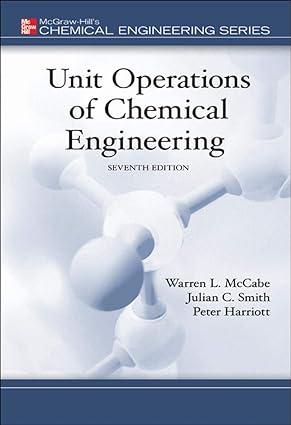A filter cake 2 in. thick in a tray dryer is exposed to a stream of air
Question:
A filter cake 2 in. thick in a tray dryer is exposed to a stream of air at 160°F. Estimate the effective coefficient for radiant heat transfer from the tray above, and compare this with the convective coefficient in Example 24.1, where the average air velocity was 8 ft/s. By what factor would the radiant heat transfer increase the initial drying rate? Would the total drying time be reduced by the same factor?
Example 24.1
A filter cake 24 in. (610 mm) square and 2 in. (51 mm) thick, sup- ported of a screen, is dried from both sides with air at a wet-bulb temperature of 80°F (26.7°C) and a dry-bulb temperature of 160°F (71.1°C). The air flows parallel with the faces of the cake at a velocity of 8 ft/s (2.44 m/s). The dry density of the cake is 120 lb/ft3 (1.922 kg/m3). The equilibrium moisture content is negligible. Under the conditions of drying the critical moisture is 9 percent, dry basis.
Step by Step Answer:

Unit Operations Of Chemical Engineering
ISBN: 9780072848236
7th Edition
Authors: Warren McCabe, Julian Smith, Peter Harriott





